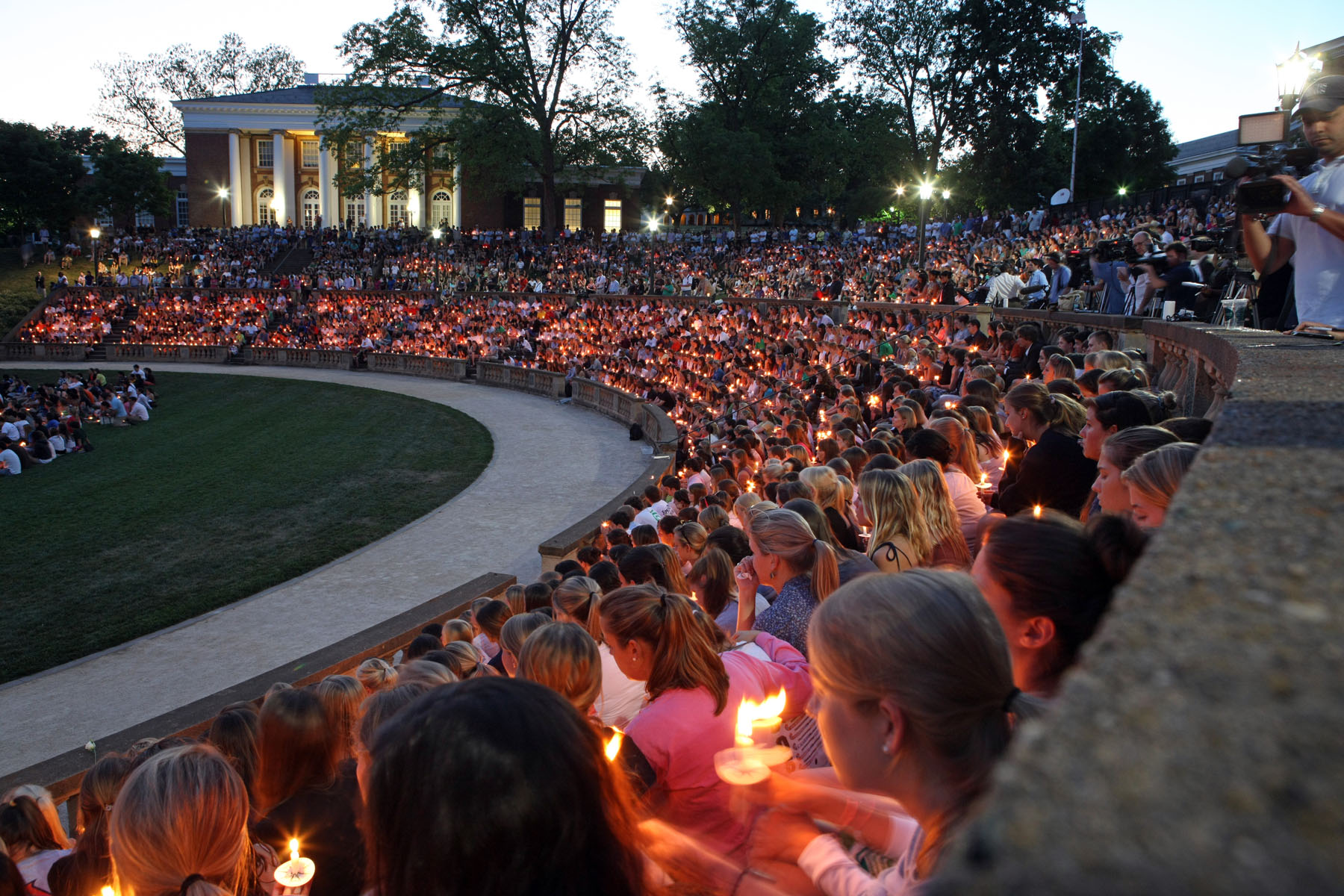September 14, 2010 — Time for gathering, quiet reflection and open discussion about issues related to violence and responsibility will be included in Day of Dialogue: Toward a Caring Community on Sept. 24 at the University of Virginia.
U.Va. President Teresa A. Sullivan emailed students, faculty and staff today, inviting them to participate in the Day of Dialogue. The events, which include a public art project, are intended to allow healing and steps of change to emerge in the aftermath of the death in May of fourth-year student Yeardley Love, allegedly at the hands of a fellow student.
"With the start of the new academic year, it is important to continue the conversation that began in the wake of Yeardley's death," Sullivan earlier wrote to the University community. "It is my hope that a full day of open and vigorous discussion about violence, violence prevention and best practices for campus safety will bring us together in new ways so that each of us can feel safe to participate fully in the life of the University."
The day's activities will feature Sullivan's welcome; sessions with faculty members facilitating dialogue on two broad, relevant questions; and reflections from Michael Suarez, University Professor and director of the Rare Book School. A community picnic lunch and resource fair will be held in the McIntire Amphitheatre.
Sullivan's closing remarks will include the introduction of a student-led initiative, Let's Get Grounded, formed to encourage mutual respect, to teach students, faculty and staff to recognize dangerous situations, and to empower appropriate action.
This summer, Sullivan gathered a small ad hoc committee of U.Va. leaders, led by Patricia M. Lampkin, vice president and chief student affairs officer, and drama professor Gweneth West, who chairs the Faculty Senate. Their task: to envision and plan activities for the University community that would address the spiritual and emotional aspects of mourning, define characteristics of a caring community, and highlight practical resources for safety and personal responsibility.
The day centers on morning and afternoon discussion groups open to students, faculty and staff. Faculty members will facilitate dialogues on the questions "Am I my sister's/brother's keeper?" and "Are we a caring community?"
While ideas and future directions may emerge from the discussions, the emphasis will be on open dialogue. This is not intended as an answer day, West said.
"We need to dream what could be in place at the University, to create the momentum," she said.
Sanda Iliescu, a professor of architecture and art, has designed a public art project for the U.Va. community. The project, she said, expresses movement from the darkness of mourning to the lightness of healing and change, based on Aristotle's ideas of two fundamental elements of vision.
It begins with the Rotunda's columns being veiled in black, diaphanous fabric in the days leading up Sept. 24.
"This represents the University community's shared experience of grief and loss," Iliescu said. "It's emblematic of where we've been."
When the veils are rolled back, the gleaming white columns once again will reveal all that they symbolize about Thomas Jefferson's learning community.
"It would be distasteful to turn away, or avert one's eyes, from the tragedy of the young lives lost here last semester," Iliescu wrote in a description of the project. "We are fortunate at this university to have such a powerful symbol for our collective will: the Rotunda. What better way to put such sad events into focus than by taking the beautiful classical columns facing the Lawn and temporarily veiling them? These columns are so bright, so suggestive of optimism, enlightenment and natural grace."
Suarez said that Sullivan is exercising bold leadership in challenging the university community to reflect together in this way. "Such reflection requires courage and openness, and may result in our working together to build a more authentic and caring university community," he said. "Nothing we say or do on the 24th can bring back Yeardley Love, but thinking and talking together about the ways we can live with greater responsibility and sensitivity might be the start of a movement from genuine tragedy to tremendous legacy."
The day's events will run from 9 a.m. to 4:30 p.m. The opening and closing talks by Sullivan and Suarez in Old Cabell Hall auditorium will be live-streamed via the Web for those unable to attend. The Wilson Hall auditorium will be the overflow location.
Managers are encouraged to be flexible in accommodating staff requests to attend this event.
Faculty members are asked to consider how Day of Dialogue activities might fit into their courses. Students could, for example, attend one of the concurrent dialogues together, or a professor might focus class discussion that day on the same questions.
Each of the events requires registration by Sept. 20 to ensure adequate space for participants. Go to the Day of Dialogue website for the complete schedule and registration details.
Media Contact
Article Information
September 14, 2010
/content/uvas-day-dialogue-sept-24-includes-participatory-art-and-challenging-questions

